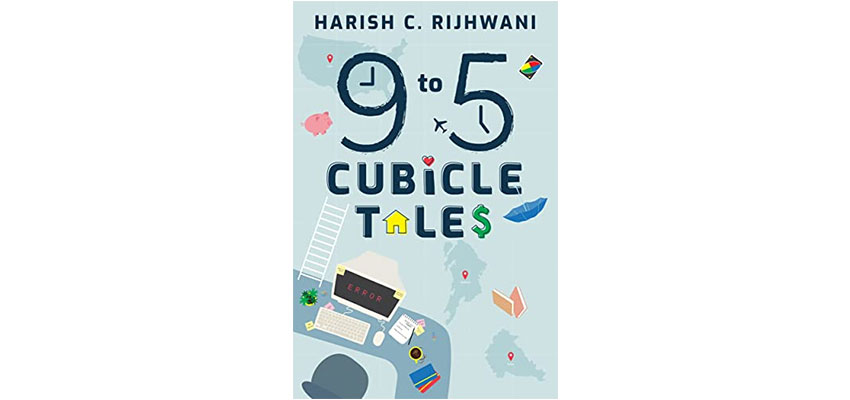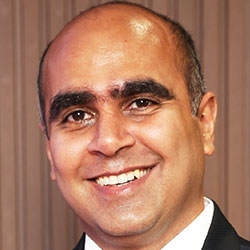Being Innovative is Vital to Success

Author Harish C Rijhwani crafts an immensely relatable tale in his latest book, “9 to 5 Cubicle Tales”. It draws the reader into the experiences of a young man caught in the uncertainties of the corporate world. While describing the challenges one faces in the corporate world, it also shows the way to overcome obstacles while marking yourself as an important resource to your company. In an interview with Corporate Citizen, the author shares insights into surviving new challenges, the importance of fun at work, and more…
"If you want to be ahead of the competition (not only as an individual but also as a corporate), you need to find ways of doing things differently to help improve productivity"
- Harish C Rijhwani
Corporate Citizen: Your latest book 9 to 5 Cubicle Tales explores the rollercoaster ride of a young man of 22 caught in the uncertainties of the corporate world. What, in your opinion, makes it an engaging read?

Harish C Rijhwani: The book is highly relatable, as most of the characters described in the corporate environment are close to reality. I have used vivid descriptions to help readers visualise the characters and scenes. The book explores various emotions, the joy of finding a job, the anger when facing a demanding boss, and the sadness of losing someone very close to you. Additionally, my writing style is narrative and in first person, so the reader will feel as it is their own story.
CC: Hridaan Rajdev – the main character, struggles to meet deadlines, battles rejection and is stung by office politics. How common are these challenges for youngsters in the real world?
A college graduate starting his career faces various challenges in the corporate world. Financial struggles are common for many new joiners; some also take loans to complete their studies or have a responsibility to run their house. In addition, at the beginning of your career, building new relationships with seniors can be challenging. A junior resource also feels anxious about handling specific situations, whether interacting with the client or your manager.
CC: The book also follows Hridaan’s exploration of the fun side of work. How important an aspect is this in one’s work life?
Corporate life can be filled with stress daily, be it the tension of meeting a deadline or being nervous about your appraisal. But fun at work can not only reduce stress; it can help enhance teamwork and improve creativity. Above all, it is one of the best ways to balance the pressure of office life.
CC: How does the book address the challenges one faces in the corporate world and show the way to overcome obstacles while marking yourself as an important resource to your company?
Young professionals face two main types of challenges, viz. personal and professional, which the book focuses on covering. Specifically, from a corporate perspective, one meets various characters; some might support you, while others will oppose your thoughts and ideas. The book highlights that some problems can be solved quickly after some guidance from your seniors. However, in many cases, one must be innovative and think out of the box. Each day in the corporate world is a new challenge, but whatever the situation the book showcases, one needs to be calm. Overall, one needs to be persistent in achieving a goal and face challenges head-on, as that is when one is forced to think differently.
CC: How crucial is it to be innovative in today’s world to survive amidst the new challenges that come one’s way?
Being innovative is vital to success today because it will be difficult to adapt to change if you aren’t. If you want to be ahead of the competition (not only as an individual but also as a corporate), you need to find ways of doing things differently to help improve productivity.
CC: Hridaan’s quest to prove his mettle to support his family and fulfil his dreams is one that many of us share. In your experience, do we keep raising the bar even when we fulfil these basics?
I don’t think it’s about raising the bar but having a goal in mind. Because if you have a dream, you will work towards positively achieving the same. A close friend asked me how I felt when it was the last session of a particular subject. I told her I didn’t feel anything different than taking my first lecture, but I look back and think about what I learned and how to improve. Technically speaking, when I reach a goal, I feel content, but I also think, what more should I do? So the thought keeps me moving forward step by step.
CC: What were your personal learnings as an author during your journey of crafting a piece of corporate life in 51 chapters?
I started writing this book in September 2021; I wrote one chapter but realised my writing lacked depth. Hence, I decided to do a couple of courses from the British Council Library around creative writing. I realised I was missing various fictional elements regarding dialogues, plot, setting, and the writing norm of “Show, Don’t Tell.” So, armed with this newfound knowledge of writing, I set out to complete my debut novel. I wrote at least 500 words every night from March 2022 and finished the first draft by mid-July 2022. In between, I had to think of an appropriate title for the book as I ideated nearly 60 different names, and none sounded fiction. Finally, after much brainstorming, I finalised 9 to 5 Cubicle Tales.
CC: How much has the corporate landscape changed in the last 20 years?
During my MBA, we were told to read a book titled, The Goal by Eliyahu Goldratt. The gist of the book is that the goal of any company is to make money, which hasn’t changed in the past 20 years. Therefore, an essential aspect for employees (especially juniors) is knowing how to contribute to the company’s goal/ big picture. The other point that has changed is gauging new joiners on practical experience rather than theoretical knowledge. Organisations have started to focus on this by leveraging hackathons and other means to hire employees. Additionally, with the advent of new AI tools, one could see more changes in the near future.
CC: A healthcare IT professional, a professor, a writer, an author, how do your various roles come together?
If I look back, I started my journey as the co-author of an unpublished book during my engineering days. But my primary career has been that of a health IT professional for the past 20 years. My educator journey started when I had 10 years of experience and started teaching healthcare IT to hospital management students (physicians, dentists, and students from other backgrounds). In parallel, I started writing healthcare blogs for my organisation. Then, a few years ago, I considered converting my healthcare knowledge into a book and wrote my first non-fiction book in, Healthcare Decoded. At this time, is when I started my journey as an indie author. Finally, in the past year, I also published two Udemy courses; again, I started with my core strength in healthcare IT.
CC: What was your larger key objective of writing a fiction book after issuing three non-fictional books, namely Healthcare Decoded, Technology to Business, and Master the Mystic Arts?
My first three books are educational, catering to a niche market, and I tried to share the information via short stories. After that, however, I wanted to cater to a larger audience, which pushed me to write a fictional series.
ABOUT THE AUTHOR
Harish C. Rijhwani, author of the book 9 to 5 Cubicle Tales, has 20 years of corporate experience and 10 years as a visiting faculty, teaching in various management institutions.
- Publisher: Self-published
- Pages: 316
- Publication: 2022
- Price: Rs 549